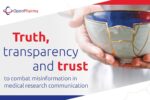This week, we look ahead to COPE Publication Integrity Week 2025 and amplify the launch of the 2025 ORCID Global Participation Fund. We also celebrate the launch of Open Pharma Member Alfasigma’s new open access publishing mandate. We read a perspective that asserts more should be done to truly recognize the role of research participants as contributors and co-producers of knowledge, and we learn of DOAJ’s recommitment to the Principles of Open Scholarly Infrastructure. Finally, we read an interview with Naila Kabeer about the importance of open access publishing for global impact.
To engage with:
Publication Integrity Week 2025 via COPE
The 2025 Committee on Publication Ethics (COPE) Publication Integrity Week will take place from Monday 17 to Friday 21 November. This online event (free for COPE Members) will convene global voices to explore the latest challenges and innovations in publication integrity. Each day, webinars and workshops will focus on distinct themes, including: the evolving landscape of publication ethics; diversity, equity, inclusion and accessibility in practice; collaboration and community building; upholding publication integrity; and innovations, solutions and the road ahead. The COPE website provides more information about the programme and registration for members and non-members.
ORCID launches 2025 Global Participation Fund via ORCID
The Open Researcher and Contributor iD (ORCID) Global Participation Fund is back for 2025, offering financial support to projects that advance ORCID adoption in organizations across under-represented regions and communities, specifically in the Global South. The fund is open to non-profit organizations, non-governmental organizations and government entities to support projects that progress community development and outreach or technical integrations. Successful proposals will be granted US$5 000–20 000 for one year. More information, including full submission instructions and frequently asked questions, can be found on the ORCID website.
To read:
Alfasigma announces open access mandate for scientific publications via Alfasigma | 1-minute read
Open Pharma Member Alfasigma has introduced a new open access policy, committing to make all company-sponsored research publications freely available. By removing paywalls for all supported publications, Alfasigma aims to ensure that healthcare professionals, researchers and patients can benefit from unrestricted access to its research outputs. Announced in celebration of Open Access Week, the announcement “reinforces Alfasigma’s values of transparency, collaboration and responsibility”.
Share results with participants to make science truly open via PLOS Medicine | 7-minute read
“… disseminating results to study participants is essential for maximizing the values and benefits of open science”, begins this perspective by Ka Hin Tai (PhD Student at the University of Rennes), Gérard Le Goff (Patient Representative with France Rein Bretagne), Anne Le Louarn (Assistant Director of the National Research Coordination Committee), Nchangwi Syntia Munung (Bioethics Researcher at University of Cape Town) and Florian Naudet (Associate Professor of Medicine at the University of Rennes). Reflecting on a recent study, the authors assert that more should be done to share clinical trial results with participants, a move they argue respects participants as “contributors and co-producers of knowledge”.
DOAJ renews commitment to Principles of Open Scholarly Infrastructure via DOAJ Blog | 1-minute read
The Directory of Open Access Journals (DOAJ) has reaffirmed its commitment to the updated Principles of Open Scholarly Infrastructure. Version 2 of the principles was released earlier this month and includes expanded commitments to long-term stewardship, community value, transparent operations and interoperability.
Open access publishing for global impact via LSE Blogs | 6-minute read
“The culture of open access still isn’t strong enough globally, we need to build more partnerships and expand network”. That’s the message from Naila Kabeer (Professor of Gender and Development at The London School of Economics and Political Science [LSE]) in this interview to mark International Open Access Week. Naila argues that open access is not just a publishing model; it’s a moral imperative, calling knowledge “part of the commons”.
Enjoy our content? Read last week’s digest and check out our latest guest blog!
Don’t forget to follow us on Bluesky and LinkedIn for regular updates!


![[[A close-up view of a traditional printing press in operation, showing metal type and inked rollers in motion as printed material is prepared.]]](https://www.openpharma.blog/wp-content/uploads/2025/12/16Dec25-150x100.jpg)



